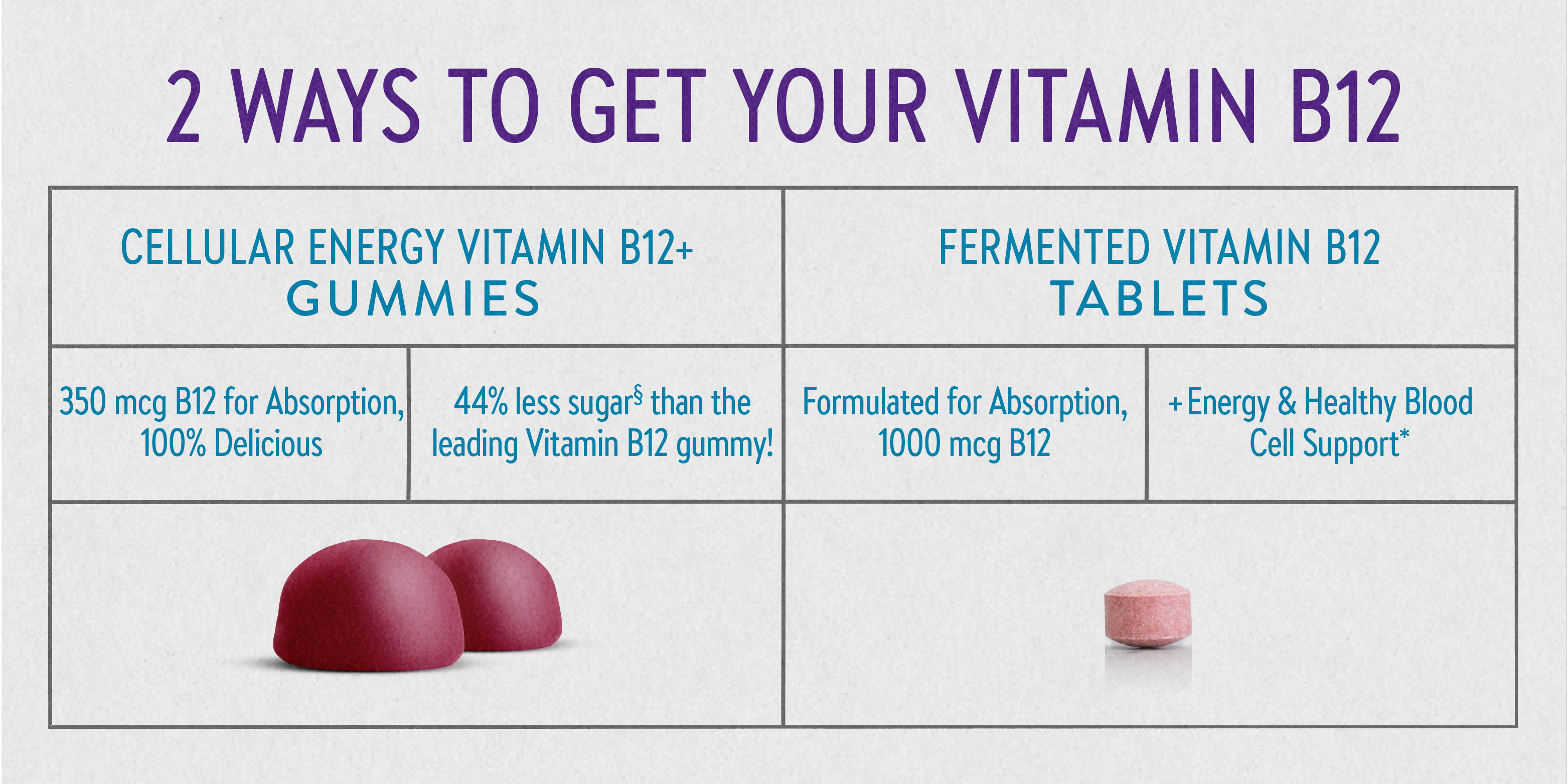Jan 30th 2023
3 Essential Nutrients Americans Need: Vitamins C, D3 & B12
Have you been taking your vitamins, especially your B12, C, and D3? These 3 vitamins are essential for Americans to consume on a daily basis. Let’s take a closer look at why these are so critical and why you may want to add them to your supplement regimen if you’re not taking them already.
Vitamin C Benefits
There’s a long history of humans taking Vitamin C as a supplement. Even before we knew what Vitamin C was (the compound was officially identified in 1928), sailors on sea voyages knew to eat citrus for the Vitamin C benefits and prevention of scurvy. Vitamin C is water soluble. It is NOT made in the human body. That means our need for Vitamin C can only be met through food and supplements. Let’s run through some top Vitamin C FAQ.
What does Vitamin C do?
Vitamin C (ascorbic acid) is best known for supporting the immune system.* It’s also a powerful antioxidant that helps protect cells from the effects of toxins and pollutants. Vitamin C helps us to absorb Iron and process other vitamins and amino acids such as Folic Acid and tryptophan. Researchers also find that Vitamin C is important for healthy adrenal function.*
What is Vitamin C good for?
Vitamin C is essential for healthy immune function.* It’s also required by the body to make collagen. Taking a Vitamin C supplement, therefore, can be good for overall immune support as well as for collagen production that supports healthy skin and gums.* Visit our Vitamin C blog for more science on this fascinating nutrient.
How much Vitamin C do I need per day?
Vitamin C is important for every body! There is a slight variance in recommended Vitamin C per day for a woman versus for a man. According to the National Institutes of Health, the following are average daily recommended amounts of Vitamin C:
- Adult men: 90 mg (milligrams)
- Adult women: 75 mg
- Pregnant people: 85 mg
- Breastfeeding people: 120 mg
What foods have Vitamin C?
Vitamin C can be found in fruits and vegetables, particularly citrus fruits, bell peppers, strawberries, and cruciferous vegetables (such as broccoli, cabbage, and kale). However, some scientists find that with soil health declining over the past ~70 years, the nutrient density of our food is also declining. With food composition changing over time, it’s hard to track or even trust vitamin intake from food. Read more about this topic in our blog about nutrient loss in soil and produce.
How do I find the best Vitamin C supplements for me?
Because it’s hard to know if you’re getting adequate vitamin C from your diet, taking a daily supplement helps you meet your needs reliably. When choosing the best Vitamin C supplement for you, consider the quality and effectiveness of each formula. New Chapter® Vitamin C supplements are meticulously formulated with excellent quality Vitamin C designed for absorption. Like all New Chapter vitamins, they’re Non-GMO Project verified and made using organic ingredients so you can feel good about what you’re putting into your body.
One-Daily Vitamin C Tablets:
Immune Defense one-daily tablets are crafted for absorption with probiotic-fermented Vitamin C. Each one-daily tablet is an excellent source of C, delivering 278% Daily Value along with a bounty of complementary herbs including Elderberry and Turmeric.
100% Delicious Vitamin C+ Gummies:
Immune Defense 2-daily gummies are made with organic blue agave fiber instead of unnecessary extra sugar. In fact, they have 40% less sugar† than the leading C gummy! These citrus-flavored gummies are packed with 139% Daily Value of Vitamin C plus 50% Daily Value of Zinc for an immune-supportive pairing that helps you stay well year-round.

Vitamin D3 Benefits
There are two main types of Vitamin D. Vitamin D2 (ergocalciferol) comes from plants. It’s used to fortify foods like cereal, milk, and juice. Vitamin D3 (cholecalciferol) is the type that’s naturally produced by the body when sunlight hits the skin. D3 is considered “bioactive” because our bodies can create and absorb it. You can also get Vitamin D3 from supplements. There is evidence that D3 is more potent and lasts longer in the body than D2.
As people are getting more conscientious about limiting sun exposure and wearing sunscreen, Vitamin D3 insufficiency is becoming a concern. Other factors like aging and skin color can also affect your natural production of D. In addition, people are more aware of Vitamin D3 benefits for many systems throughout the body,
including immune support, so supplementing with D is gaining momentum quickly! D3 is so important that the Council on Responsible Nutrition created an expert website, Vitamin D & Me, to connect people with more information and resources.
What does Vitamin D do?
One of the top Vitamin D benefits is proper absorption of calcium. D3 supports effective calcium digestion in the intestines, so the calcium can then get to your bones and teeth where you want it. Read our blog for details on how Vitamin D impacts bone strength.
Other benefits? Vitamin D3 is linked to heart and overall cardiovascular health.* Vitamin D3 benefits also include support for muscle strength and healthy immune function.*
How much Vitamin D should I take per day?
The National Institutes of Health lists average daily recommended amounts for Vitamin D in micrograms (mcg) and International Units (IU).
- Adults age 19-70: 15 mcg (600 IU)
- Adults 71 and older: 20 mcg (800 IU)
A large clinical trial published in 2019 found that 2000 IU per day of Vitamin D3 had promising health benefits. For example, 2000 IU of daily D3 was clinically shown to increase levels of active Vitamin D in the body in healthy adults over time. Of course, an individual’s need for Vitamin D depends on a host of factors including geography, genetics, eating patterns, and sunlight exposure.
How can I increase my Vitamin D?
Vitamin D3 can be hard to get from the average diet, especially if you don’t eat a lot of seafood.
In fact, up to 70% of Americans may have inadequate levels†† of Vitamin D! This is exactly why Vitamin D is so popular to take as a supplement. If you’re interested in increasing your Vitamin D intake or finding out more about your personal Vitamin D levels, be sure to talk to your healthcare professional. They may suggest testing to learn more about your needs.
When should I take Vitamin D?
The best time to take Vitamin D3 supplements is at a time that works for you and that you’ll remember. New Chapter’s Vitamin D3 supplements are so gentle they can be taken any time, including on an empty stomach. That makes it easy to pick what works for you!
What do I look for in D3 supplements?
We believe the best Vitamin D3 supplements are packed with excellent quality Vitamin D3 (cholecalciferol) and Non-GMO Project Verified. New Chapter bioactive Vitamin D is always formulated for your body to absorb. Choose from fermented tablets with the clinically studied amount of D3 in just one tablet a day or 100% delicious USDA organic D3 gummies.
One-Daily Vitamin D3 Tablets:
Fermented Vitamin D3 once-daily tablets are crafted for your body to absorb with probiotic-fermented Vitamin D3. Each one-daily organic tablet is rich in D3, delivering 250% Daily Value (2000 IU) along with organic Turmeric and organic Reishi mushroom.
100% Delicious Vitamin D3+ Gummies:
Strength Support one-daily gummies are made with organic blue agave fiber instead of unnecessary extra sugar—featuring 72% less sugar than the leading vitamin D gummy! These mixed berry-flavored gummies are packed with 125% Daily Value of Vitamin D3 to support strong bones and muscle function PLUS heart and immune support.*

Vitamin B12 Benefits
Vitamin B12 (cobalamin) is a water-soluble vitamin that is necessary for cellular energy and healthy blood cell production. It’s found in animal products and in fortified foods, such as cereal that has added B12. B12 is a great candidate for taking as a supplement because it is not always well-absorbed in food form.
What does Vitamin B12 do?
Your body needs Vitamin B12 to create energy from the food you eat and to support healthy red blood cells.* In addition, B Vitamins benefit your brain and nervous system.* B12’s specialty is helping to build and maintain the myelin sheath that surrounds, protects, and insulates the nerves.* Learn more Vitamin B12 benefits in our blog about How B Vitamins Can Help Improve Your Nerve Health.
What foods contain B12?
Foods high in Vitamin B12 include fish, meat, poultry, and dairy products. Clams and beef liver are excellent sources of B12, but most people don’t eat these very often. Because B12 is important for public health, some products, like breakfast cereals, have added B12.
Am I digesting B12 properly?
Interestingly, B12 that comes from food is not the easiest form for the body to process. There are several linking factors that need to be in place before the body can properly absorb food-based B12. In addition, not everyone eats high amounts of the foods that contain B12. This is why finding the right B12 supplement can help fill in nutrient gaps effectively.
Who should take Vitamin B12?
Honestly, anyone can consider adding this important nutrient to their healthy supplement regimen. Because B12 is found in animal products, it tends to be under-consumed by vegetarians and vegans. Talk to your healthcare professional if you have questions!
How much B12 should I take?
According to the National Institutes of Health, the following are average daily recommended amounts of Vitamin B12:
- Adults over 18: 2.4 mcg (micrograms)
- Pregnant people: 2.6 mcg
- Breastfeeding people: 2.8 mcg
However, supplements generally deliver higher amounts of B12. The body can only absorb a percentage of the total amount, so don’t be alarmed to see high % Daily Values listed for B12 supplements.
How do I find the best Vitamin B12 supplement?
New Chapter brings you excellent quality, bioactive Vitamin B12 supplements that are fine-tuned for your body to absorb. They’re carefully formulated so you can get the most out of every tablet or gummy.
One-Daily Vitamin B12 Tablets:
Fermented Vitamin B12 once-daily tablets are crafted for your body with a blend of bioactive methylated B12 and probiotic-fermented B12. Each tablet is packed with 41,667% Daily Value of B12 (1000 mcg) along with complementary herbs like organic Maca (a superfood from Peru).
100% Delicious Vitamin B12+ Gummies:
Cellular Energy twice-daily gummies are made with organic blue agave fiber instead of unnecessary extra sugar—featuring 44% less sugar than the leading Vitamin B12 gummy! These raspberry-flavored gummies deliver 14,583% Daily Value (350 mcg) of Vitamin B12 to help your body convert food into fuel and support healthy nerve function.*

Building Your Best Regimen
Long story short? Your body needs C, D3, and B12 for essential functions that include immune defense, bone maintenance, and energy metabolism.* No matter what your supplement regimen is, getting reliable sources of these nutrients every day helps to nourish your body WELL. Your supplement regimen can always change and grow with you. Many people take some regular core products, and then add other products seasonally or when the need pops up. New Chapter is here for you with pioneering vitamins formulated to give your body exactly what it needs. Keep taking steps to feel your best!
Next, check out
our blog about creating the best supplement regimen for you.
† 40% less sugar than leading vitamin C gummy, based on Nielsen Total US XAOC $ sales latest 52 w/e 05/21/22
†† Based on the Endocrine Society’s definition of vitamin D sufficiency as serum 25-hydroxyvitamin D values of >30 ng/ML.
‡ 72% less sugar than leading vitamin D gummy, based on Nielsen Total US XAOC $ sales latest 52 w/e 05/21/22
§ 44% less sugar than leading vitamin B12 gummy, based on Nielsen Total US XAOC $ sales latest 52 w/e 05/21/22











